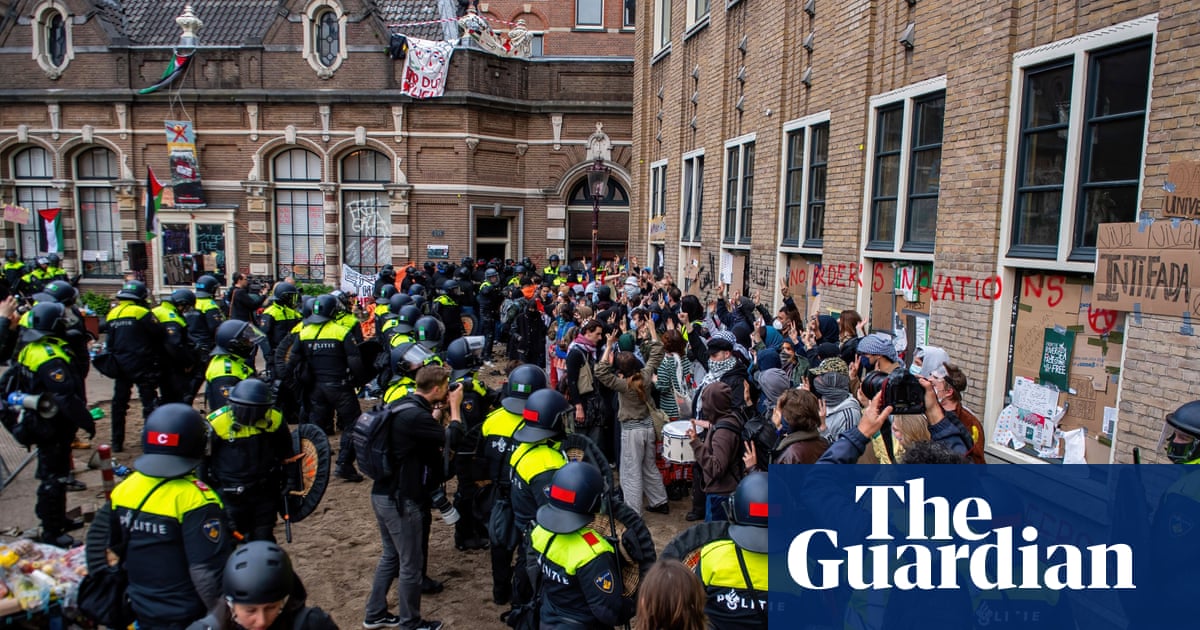
Thirty-two people were arrested as Dutch police broke up a Gaza war protest at the University of Amsterdam, in a second day of unrest over the conflict. Police said the offences included public violence, vandalism and assault.
Video captured by Reuters appeared to show officers in riot gear striking protesters and police knocking down makeshift barricades of desks, bricks and wooden pallets that seemingly had been used to set off fire extinguishers in hopes of pushing them back. The footage appeared to also show police dragging several students away as hundreds shouted: “Shame on you!”
The Dutch prime minister, Mark Rutte, said events at the university had crossed a line. “Demonstrations are allowed. Always. But using violence against the police and causing destruction is never allowed. Stop that!” he wrote on social media.
Rutte also asserted that “more and more often, and with increasingly harsh words, the violence in Gaza is being blamed on Jewish Dutch people”, describing this as unjustified and a “form of antisemitism that we must continue to fight loudly and clearly”.
About 30 miles south at Utrecht University, students occupied a building in protest while in Belgium, dozens of students have continued to occupy Ghent University in a three-day protest that has fused demands about Gaza and the climate crisis.
In Spain, protests and encampments continued at several campuses across the country. At the University of Valencia, where tents were set up 11 days ago, about 50 people are calling on Spain to sever all ties with Israel.
At Madrid’s Complutense University about 200 students crammed into 80 tents in an encampment launched this week. Similar initiatives have sprung up in Barcelona and the Basque Country.
The protests in Spain received a boost from the country’s minister of science, innovation and universities, Diana Morant, who told reporters earlier this week that she was “proud” of the students for mobilising. Spanish universities should not only be “a place for academic formation, but also critical thinking”, she added.
Spain, along with Ireland, has for months been among the EU’s sharpest critics of Israel’s response to the terrorist atrocities of 7 October. In a report published on Thursday, two sources told Ireland’s national broadcaster RTÉ that the two countries were prepared to recognise Palestinian statehood as early as 21 May.
Another source told RTÉ that talks had intensified between Spain and Ireland, as well as Slovenia and Malta – the four countries which signed on to a March statement declaring they were ready to recognise Palestinian statehood when “the circumstances are right”.
after newsletter promotion
Earlier this week Ireland’s prime minister, Simon Harris, said he had spoken to his Spanish counterpart, Pedro Sánchez, regarding their shared wish to push forward with Palestinian statehood. “We are both eager to make progress on this very shortly and our governments remain in close contact,” he said on social media.
A spokesperson for the Irish government refused to confirm or deny the May date, as did Spain’s foreign minister. “What’s really important is not the exact date, but the decision,” José Manuel Albares told reporters at a Thursday event in Madrid. “And the decision is made.”
Ahead of plans to put forward a draft resolution that would recognise Palestine as qualified to become a full UN member at the UN general assembly on Friday, Albares said Spain was prepared to vote in favour.
The commitment was echoed in Ireland, where Micheál Martin, Ireland’s tánaiste, told a meeting of the Green party that Ireland was set to vote in favour of Palestinian membership at the UN gathering.
The potential acceleration of Palestinian recognition comes as EU leaders fend off growing pressure to respond to Israel’s operation in Rafah.
At least 67 MEPs have signed a letter urging EU leaders to convene “an urgent meeting … to discuss the EU response to the events in Rafah”. The MEPs – Greens, Socialists, radical left and a few liberals – called for EU sanctions against Israel as “the only adequate response to this horrendous and reckless military campaign in Rafah and the rest of the Gaza Strip”.
EU governments, who have the power to impose sanctions by unanimity, are highly unlikely to impose sweeping sanctions against Israel. Instead, the letter offers a testament to the strength of feeling on the left of the parliament.